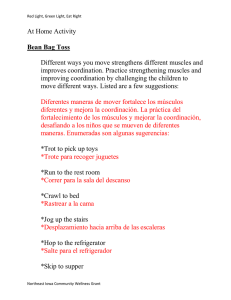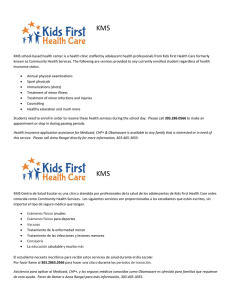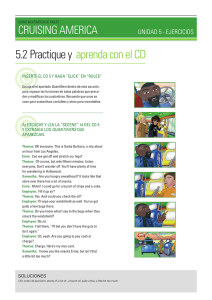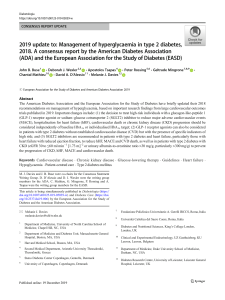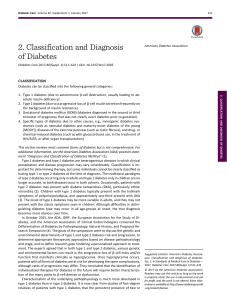Diabetes and Kidney Problems - Spanish
Anuncio
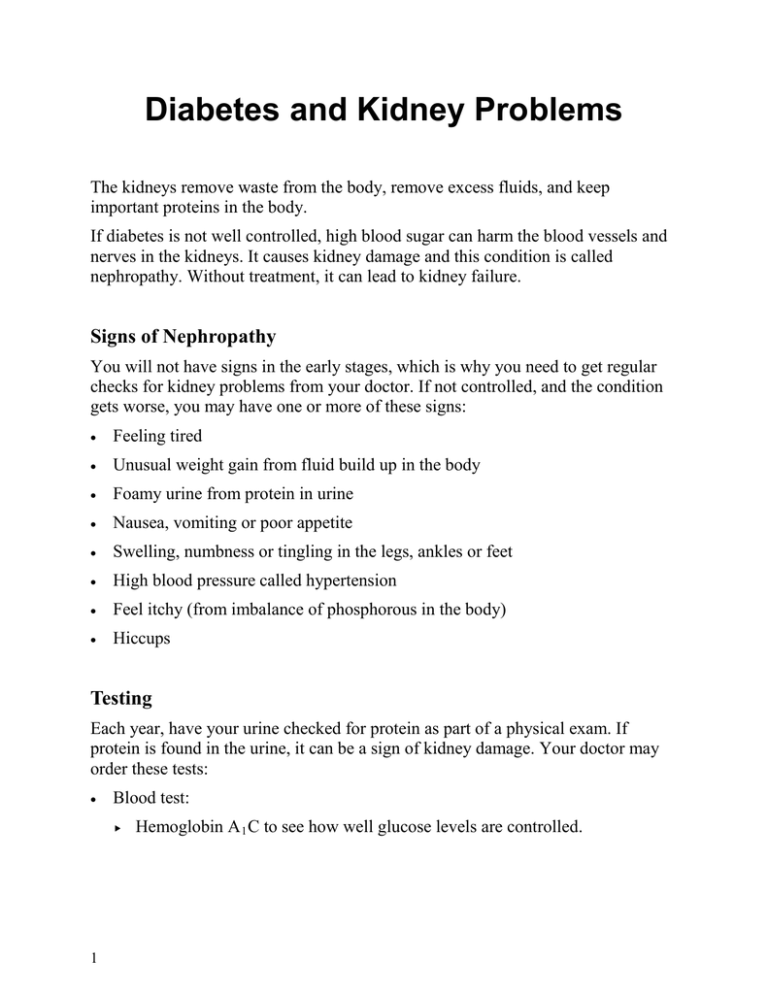
Diabetes and Kidney Problems The kidneys remove waste from the body, remove excess fluids, and keep important proteins in the body. If diabetes is not well controlled, high blood sugar can harm the blood vessels and nerves in the kidneys. It causes kidney damage and this condition is called nephropathy. Without treatment, it can lead to kidney failure. Signs of Nephropathy You will not have signs in the early stages, which is why you need to get regular checks for kidney problems from your doctor. If not controlled, and the condition gets worse, you may have one or more of these signs: • Feeling tired • Unusual weight gain from fluid build up in the body • Foamy urine from protein in urine • Nausea, vomiting or poor appetite • Swelling, numbness or tingling in the legs, ankles or feet • High blood pressure called hypertension • Feel itchy (from imbalance of phosphorous in the body) • Hiccups Testing Each year, have your urine checked for protein as part of a physical exam. If protein is found in the urine, it can be a sign of kidney damage. Your doctor may order these tests: • Blood test: 1 Hemoglobin A 1 C to see how well glucose levels are controlled. La diabetes y los problemas renales Los riñones eliminan los desechos del cuerpo, los líquidos en exceso, y mantienen las proteínas importantes en el cuerpo. Si la diabetes no se controla bien, la alta glucosa en sangre puede dañar los vasos sanguíneos y nervios en los riñones. La diabetes causa daño renal, y esta afección se conoce como nefropatía. Sin tratamiento, puede llevar a insuficiencia renal. Sígnos de nefropatía No tendrá signos en las primeras etapas, por lo que debe hacerse análisis regulares para detectar problemas en los riñones con su médico. Si no se controla y la afección empeora, tal vez tenga uno o más de los siguientes signos: • Cansancio • Aumento de peso inusual por la acumulación de líquidos en el cuerpo • Orina espumosa por la proteína en la orina • Náuseas, vómitos o poco apetito • Pies, tobillos o piernas hinchados, adormecidos o con cosquilleo • Presión arterial alta o hipertensión • Picazón (por el desequilibrio de fósforo en el cuerpo) • Hipo Exámenes Cada año, haga que analicen su orina para determinar el contenido de proteína como parte de un examen físico. Si encuentran proteínas en su orina, puede ser un signo de daño en los riñones. Su médico puede pedirle que se realice los siguientes exámenes: • Examen de sangre: Hemoglobina A 1 C para ver qué tan bien están controlados los niveles de glucosa. Diabetes and Kidney Problems. Spanish. 1 Blood urea nitrogen (BUN test) or creatinine test to check how well your kidneys are working. • Urine test for protein called albumin. You doctor may also call it a microalbuminuria test. • Foot checks to check for numbness and tingling in your feet and legs as kidney disease affects blood flow and may cause nerve damage. Nerve conduction tests may be given to check for nerve damage. • Blood pressure checks. • Blood tests for cholesterol and triglycerides. These types of fat in your blood are harder to control if the kidneys are not working well. Treatment Treatment is done to keep the kidney disease from getting worse. Blood sugar and blood pressure control can slow kidney damage. • Check and record your blood sugar levels. Take your diabetes medicines as ordered. Talk to your doctor or diabetes educator if your blood sugar levels are not controlled with medicine. • Exercise for 30 minutes at least most days of the week. • Avoid tobacco and alcohol, manage your weight, your stress and get enough sleep. Lifestyle behavior can improve your diabetes. • Talk to your doctor or pharmacist before taking any over the counter medicines. Some medicines may be harmful to weakened kidneys. For example, medicines used for pain called NSAIDS, like ibuprofen or naproxen, should not be used. • Your doctor may order medicines to lower your blood pressure while protecting your kidneys from damage. Use a home blood pressure monitor to check your blood pressure between doctor visits. 2 Nitrógeno de urea de sangre (BUN, por sus siglas en inglés,) o examen de creatinina para comprobar qué tan bien funcionan sus riñones. • Análisis de orina para determinar el contenido de proteínas llamado albúmina. Su médico también podría llamarlo, un análisis de microalbuminuria. • Exámenes de sus pies para ver si están adormecidos o si tiene cosquilleo en los pies y piernas, ya que las enfermedades renales afectan el flujo sanguíneo y pueden causar daño a los nervios. Se podrán administrar pruebas de conducción nerviosa para comprobar si hay daño en los nervios. • Controles de presión sanguínea. • Análisis de sangre para determinar el nivel de colesterol y triglicéridos. Estos tipos de grasa en su sangre son más difíciles de controlar si los riñones no funcionan bien. Tratamiento El objetivo del tratamiento es impedir que empeoren las enfermedades renales. El control de la glucosa en sangre y la presión arterial pueden ralentizar el daño a los riñones. • Mida y registre sus niveles de glucosa. Tome sus medicamentos para la diabetes según lo indicado. Hable con su médico o educador en diabetes si sus niveles de glucosa en sangre no se controlan con medicamentos. • Haga ejercicio durante al menos 30 minutos la mayoría de los días de la semana. • Evite el tabaco y el alcohol, maneje su peso, el estrés y duerma lo suficiente. Su comportamiento y estilo de vida pueden mejorar su diabetes. • Consulte con su médico o farmacéutico antes de empezar a tomar cualquier medicamento de venta libre. Algunos medicamentos pueden ser nocivos para los riñones debilitados. Por ejemplo, no debería usar medicamentos para el dolor conocidos como NSAIDS, como el ibuprofeno o naproxen. • Su médico podría recetarle medicamentos para disminuir su presión sanguínea y proteger sus riñones del daño. Use un monitor de presión sanguínea para el hogar para controlar su presión sanguínea entre visitas al médico. Diabetes and Kidney Problems. Spanish. 2 • Follow your meal plan, and talk with a dietitian about changes you can make to control your blood sugar. If your kidneys are not working well, you may need to limit protein in your diet. As kidney disease progresses, dialysis may be needed. Transplantation may also be an option for treatment. Talk to your doctor or diabetes educator if you have questions or concerns. 1/2012 Health Information Translations Unless otherwise stated, user may print or download information from www.healthinfotranslations.org for personal, non-commercial use only. The medical information found on this website should not be used in place of a consultation with your doctor or other health care provider. You should always seek the advice of your doctor or other qualified health care provider before you start or stop any treatment or with any questions you may have about a medical condition. Wexner Medical Center at The Ohio State University, Mount Carmel Health System, OhioHealth and Nationwide Children’s Hospital are not responsible for injuries or damages you may incur as a result of your stopping medical treatment or your failure to obtain medical treatment. 3 • Siga su plan de comidas y hable con un dietista acerca de los cambios que puede hacer para controlar su azúcar en sangre. Si sus riñones no funcionan bien, tal vez deba limitar la ingesta de proteínas en su dieta. A medida que la enfermedad renal avance, podría requerir diálisis. Los trasplantes también pueden ser una opción de tratamiento. Hable con su médico o educador en diabetes si tiene preguntas o dudas. 1/2012 Health Information Translations Unless otherwise stated, user may print or download information from www.healthinfotranslations.org for personal, non-commercial use only. The medical information found on this website should not be used in place of a consultation with your doctor or other health care provider. You should always seek the advice of your doctor or other qualified health care provider before you start or stop any treatment or with any questions you may have about a medical condition. Wexner Medical Center at The Ohio State University, Mount Carmel Health System, OhioHealth and Nationwide Children’s Hospital are not responsible for injuries or damages you may incur as a result of your stopping medical treatment or your failure to obtain medical treatment. Diabetes and Kidney Problems. Spanish. 3

